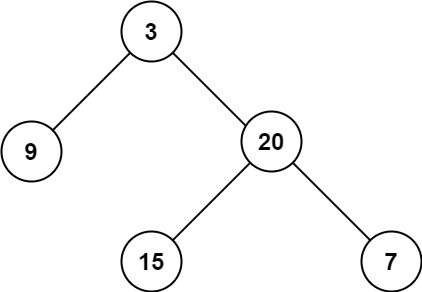104. Maximum Depth of Binary Tree
Given the root of a binary tree, return its maximum depth.
A binary tree’s maximum depth is the number of nodes along the longest path from the root node down to the farthest leaf node.
1
2
3
4
| Example 1:
Input: root = [3,9,20,null,null,15,7]
Output: 3
|

1
2
3
4
| Example 2:
Input: root = [1,null,2]
Output: 2
|
1
2
3
4
| Example 3:
Input: root = []
Output: 0
|
1
2
3
4
| Example 4:
Input: root = [0]
Output: 1
|
Constraints:
- The number of nodes in the tree is in the range [0, 104].
- -100 <= Node.val <= 100
1
2
3
4
5
6
7
8
9
10
11
12
13
14
15
16
17
18
19
20
21
22
23
24
25
26
27
28
29
30
31
32
33
34
35
36
37
38
39
40
41
42
43
44
45
46
47
48
49
50
51
52
53
54
| /**
* Definition for a binary tree node.
* public class TreeNode {
* int val;
* TreeNode left;
* TreeNode right;
* TreeNode() {}
* TreeNode(int val) { this.val = val; }
* TreeNode(int val, TreeNode left, TreeNode right) {
* this.val = val;
* this.left = left;
* this.right = right;
* }
* }
*/
class Solution {
public int maxDepth(TreeNode root) {
List<TreeNode> nodes = new ArrayList<>();
List<Integer> depths = new ArrayList<>();
if (root == null) return 0;
nodes.add(root);
depths.add(1);
int max = 0;
while (!nodes.isEmpty()) {
TreeNode node = nodes.remove(0);
int depth = depths.remove(0);
max = Math.max(max, depth);
if (node.left != null) {
nodes.add(node.left);
depths.add(depth + 1);
}
if (node.right != null) {
nodes.add(node.right);
depths.add(depth + 1);
}
}
return max;
}
int max = 0;
public int maxDepth2(TreeNode root) {
if (root == null) return 0;
depth(root, 1);
return max;
}
void depth(TreeNode node, int depth) {
if (node == null) return;
max = Math.max(max, depth);
depth(node.left, depth + 1);
depth(node.right, depth + 1);
}
}
|
